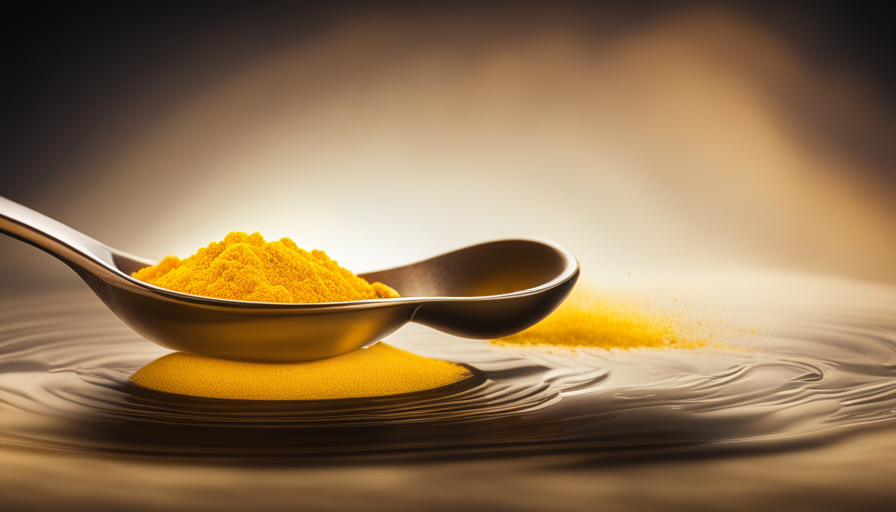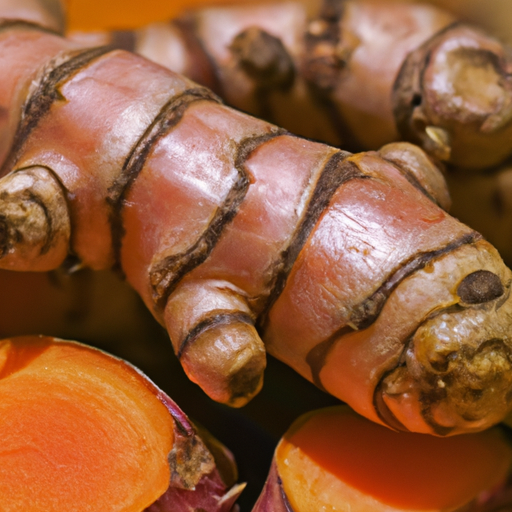I’ve long been an enthusiast of tea, and I recently stumbled upon the marvels of ginger turmeric tea. This tea is not only tasty and comforting but also brimming with health advantages, making it an excellent choice for anyone’s wellness regimen.
Ginger turmeric tea is made from fresh ginger root and turmeric root, both of which have been used for centuries in traditional medicine. This powerful combination can help alleviate inflammation, boost immunity, and improve digestion, among other things.
In this article, I’ll dive into the specific health benefits of ginger turmeric tea, how to make it at home, precautions to keep in mind when consuming it, and where to buy it if you don’t feel like making your own.
So grab a cup of tea (ginger turmeric or otherwise) and let’s dive in!
Key Takeaways
- Ginger turmeric tea has numerous health benefits, including anti-inflammatory properties, antioxidant content, and aiding digestion.
- Ginger and turmeric both have medicinal properties and have been used for centuries in Asian and Indian cuisines.
- Turmeric contains curcumin, which has potent antioxidant and anti-inflammatory effects and may help prevent cancer.
- While ginger turmeric tea is generally safe, precautions should be taken, especially if consuming large amounts or if taking blood-thinning medications.
What is Ginger Turmeric Tea?
You’re probably wondering what ginger turmeric tea is, but imagine a warm and comforting blend of spicy ginger and earthy turmeric steeped in hot water to create a deliciously healthy beverage.
Ginger turmeric tea has a unique taste and flavor profile that is distinct from other herbal teas. The pungent aroma of ginger and the subtle bitterness of turmeric create a balanced mix that leaves your palate feeling refreshed.
Brewing techniques for ginger turmeric tea can vary depending on personal preference. Some people prefer to use fresh ingredients, while others use powdered versions for convenience. To make the perfect cup, simply add boiling water to your preferred amount of tea leaves or powder, let steep for 5-10 minutes, then strain before drinking.
The health benefits of ginger turmeric tea are numerous and well documented. It has anti-inflammatory properties that can help with joint pain and stiffness, as well as antioxidants that may reduce the risk of chronic diseases such as cancer and heart disease. Additionally, it aids in digestion by reducing bloating and nausea.
With all these benefits in mind, it’s no wonder why ginger turmeric tea is becoming increasingly popular among health enthusiasts worldwide!
The Health Benefits of Ginger Turmeric Tea
I love drinking ginger turmeric tea, not just because of its spicy and refreshing taste, but also because of the numerous health benefits it offers.
For one, this tea has anti-inflammatory properties that can alleviate pain and reduce swelling in the body. It also boasts antimicrobial and antioxidant properties that help fight off infections and free radicals that cause cell damage.
If you’re looking for a natural way to boost your immune system, ginger turmeric tea can certainly do the trick! Plus, studies show that this tea may even help prevent cancer and improve digestive health.
Anti-inflammatory properties
By regularly consuming ginger turmeric tea, you’ll experience a reduction in inflammation due to the potent anti-inflammatory compounds found in both ingredients. Ginger contains compounds like gingerols and shogaols which have been shown to reduce inflammation by inhibiting the production of pro-inflammatory cytokines.
Turmeric, on the other hand, contains curcumin which is known for its strong anti-inflammatory effects. Studies have shown that curcumin can help reduce inflammation in conditions such as arthritis, asthma, and inflammatory bowel disease.
To make ginger turmeric tea at home, there are plenty of recipes available online. A simple recipe involves steeping fresh ginger and turmeric root (or ground powders) in hot water for a few minutes before adding honey or lemon for taste. It’s important to note that excessive consumption of ginger or turmeric may lead to side effects such as heartburn or upset stomach, so it’s recommended to follow dosage guidelines and consult with a healthcare professional if necessary.
In addition to their anti-inflammatory properties, ginger and turmeric also possess antimicrobial and antioxidant properties which make them excellent additions to any diet for overall health benefits.
Antimicrobial and antioxidant properties
The antimicrobial and antioxidant properties found in ginger and turmeric make them great additions to any diet for boosting overall health. Here are four ways these properties can benefit you:
-
Fight off harmful bacteria: Both ginger and turmeric contain compounds that have been shown to inhibit the growth of harmful bacteria in the body, including E.coli, Salmonella, and Staphylococcus aureus.
-
Boost your immune system: The antioxidants found in ginger and turmeric help to protect your cells from damage caused by free radicals, which can weaken your immune system over time.
-
Improve skin health: Ginger has been used for centuries as a natural remedy for various skin conditions, such as acne and eczema. Turmeric also has anti-inflammatory properties that may help reduce redness and inflammation associated with these conditions.
-
Add flavor to your meals: Ginger and turmeric are commonly used in cooking due to their unique flavors and health benefits.
In addition to their uses in cooking and potential for skincare, these spices also serve as an immune system booster.
Immune system booster
Boosting your immune system can be achieved by incorporating ginger and turmeric into your daily diet. Both of these herbs contain compounds that have been shown to enhance the activity of immune cells, helping you fight off infections and diseases more effectively.
Ginger turmeric tea is one of the easiest ways to incorporate these powerful herbs into your daily routine. To make this tea, simply steep a few slices of fresh ginger and a teaspoon of ground turmeric in hot water for 5-10 minutes. You can also add honey or lemon juice for added flavor and additional health benefits.
The recommended dosage is 1-2 cups per day, but always consult with your healthcare provider before making any significant changes to your diet or supplement regimen.
Incorporating ginger and turmeric into your diet not only helps boost your immune system but has also been linked to cancer prevention. By consuming these herbs regularly, you may be able to reduce inflammation in the body and protect against cellular damage that can lead to cancer development.
So why not start today by trying out some delicious ginger turmeric tea recipes?
Cancer prevention
Incorporating ginger turmeric tea into your daily routine can potentially reduce inflammation in the body and protect against cellular damage, leading to a decreased risk of developing cancer. This powerful herbal combination has been studied extensively for its cancer-fighting properties. Here are five ways ginger turmeric tea may help prevent cancer:
-
Inhibits tumor growth: Turmeric contains curcumin, which has been shown to inhibit the growth of various types of cancer cells.
-
Reduces oxidative stress: Both ginger and turmeric have antioxidant properties that can reduce oxidative stress, which is known to contribute to cancer development.
-
Improves immune function: The immune system plays a crucial role in preventing cancer by identifying and destroying abnormal cells. Ginger turmeric tea has been shown to improve immune function, thus reducing the risk of developing cancer.
-
Decreases inflammation: Chronic inflammation is associated with an increased risk of developing certain types of cancers. Ginger and turmeric both have anti-inflammatory properties that can decrease chronic inflammation in the body.
-
Enhances DNA repair: Turmeric contains compounds that enhance DNA repair mechanisms, reducing the likelihood of mutations that could lead to cancer.
Making dietary recommendations for cancer prevention is challenging as there’s no one-size-fits-all approach. However, incorporating ginger turmeric tea into your daily routine may be a practical way to reduce your risk of developing this disease.
Moving on to digestive benefits…
Digestive benefits
If you’re looking for a natural way to soothe your stomach, adding ginger turmeric tea to your daily routine might just be the cherry on top. This warm beverage is packed with digestive enzymes that can help break down food and improve gut health.
Ginger, in particular, has been shown to stimulate digestion by increasing the production of saliva, bile, and stomach acid. Turmeric, on the other hand, has anti-inflammatory properties that can reduce inflammation in the gut lining. Inflammation in the gut can lead to a host of problems such as bloating, gas, and diarrhea.
Drinking ginger turmeric tea regularly may help alleviate these symptoms and promote overall digestive wellness. With its numerous benefits for gut health, it’s no wonder why this tea has become so popular among health enthusiasts all over the world.
Another benefit of ginger turmeric tea is its ability to provide natural pain relief.
Pain relief
Relieve your pain naturally with the warming and comforting properties of ginger turmeric tea. Natural alternatives to pain relief are always preferable over pharmaceuticals, as they tend to have fewer side effects.
Holistic remedies like ginger turmeric tea have been used for centuries to ease pain caused by various ailments, including arthritis, menstrual cramps, headaches, and muscle soreness. Here are some reasons why ginger turmeric tea can help alleviate your pain:
- Ginger contains compounds called gingerols and shogaols that possess anti-inflammatory properties.
- Turmeric contains curcumin, which is also known for its anti-inflammatory effects.
- Both ginger and turmeric are natural analgesics (pain relievers).
- The combination of these two ingredients creates a potent natural remedy for pain management.
In addition to its pain-relieving benefits, drinking ginger turmeric tea regularly can also improve your skin’s appearance due to its anti-aging properties.
Anti-aging properties
Drinking ginger turmeric tea regularly can help you achieve a more youthful appearance due to its anti-aging properties. Both ginger and turmeric are known for their potent antioxidant effects, which can neutralize free radicals in the body that damage cells and cause signs of aging. These antioxidants also have anti-inflammatory effects, which can reduce inflammation in the body and prevent chronic diseases associated with aging.
Moreover, ginger turmeric tea has skin benefits as well. The same antioxidants that protect your body from oxidative stress also protect your skin from environmental pollutants and UV radiation that damage collagen and elastin, leading to wrinkles and sagging skin. Additionally, studies have shown that curcumin, the active compound in turmeric, may boost collagen production in the skin, improving its elasticity and firmness.
With these longevity effects on both internal health and external beauty, drinking ginger turmeric tea is an easy way to support healthy aging.
In addition to its anti-aging properties, ginger turmeric tea has been linked to improvements in cardiovascular health. Regular consumption of this herbal infusion has been shown to improve blood lipid profiles by reducing LDL cholesterol levels while increasing HDL cholesterol levels. This can lead to a lower risk of heart disease and stroke over time.
So, not only does this drink help us look younger, but it also supports our overall health!
Cardiovascular health
As I mentioned earlier, ginger turmeric tea has anti-aging properties that can benefit our overall health and well-being. But did you know that it also plays a vital role in maintaining cardiovascular health?
Studies have shown that the active compounds found in ginger and turmeric can help prevent heart diseases by lowering cholesterol levels, reducing blood pressure, and improving blood circulation.
Here are four ways ginger turmeric tea can support your cardiovascular health:
-
Reduces inflammation: Inflammation is one of the leading causes of heart diseases. The anti-inflammatory properties of ginger and turmeric can help reduce inflammation in the arteries, preventing plaque buildup.
-
Lowers cholesterol: High levels of LDL or ‘bad’ cholesterol can lead to atherosclerosis, a condition where plaque builds up inside the arteries. Ginger and turmeric both have compounds that lower LDL cholesterol levels.
-
Improves blood circulation: The bioactive compounds found in these herbs improve blood flow by relaxing the muscles surrounding blood vessels.
-
Regulates blood pressure: High blood pressure is another risk factor for heart disease. Both ginger and turmeric contain compounds that help regulate blood pressure.
Incorporating prevention strategies such as dietary recommendations, like drinking ginger turmeric tea regularly, is an excellent way to maintain good cardiovascular health.
In the next section, I’ll share with you how to make this delicious tea at home!
How to Make Ginger Turmeric Tea
If you’re looking for a warm and soothing beverage that’s packed with health benefits, try making ginger turmeric tea at home. Ginger and turmeric are both known for their anti-inflammatory properties, which can help reduce pain and swelling in the body.
In addition, studies have shown that regularly consuming ginger turmeric tea may improve brain function, boost immunity, and even lower the risk of chronic diseases like cancer.
To make ginger turmeric tea, simply grate or slice fresh ginger and turmeric root into a pot of boiling water. You can also add other ingredients like lemon juice, honey, or cinnamon to enhance the flavor and health benefits of the tea.
For a stronger taste, let the mixture steep for about 10-15 minutes before straining out the solids.
There are many variations on this basic recipe depending on your personal preferences or specific health needs. Some people prefer to use powdered forms of ginger and turmeric instead of fresh roots, while others like to mix in other herbs like mint or chamomile for added relaxation benefits.
Just be sure to do your research on any additional ingredients you plan to add to ensure they don’t interfere with any medications you might be taking. Speaking of which…
Precautions should always be taken when starting any new supplement or dietary regimen – even one as seemingly innocuous as drinking ginger turmeric tea. While side effects are generally rare with these two spices when consumed in normal culinary quantities (i.e., less than 1 gram per day), there have been reports of gastrointestinal upset or allergic reactions in some individuals who consume large amounts over an extended period of time.
If you experience any adverse symptoms after drinking this tea – such as nausea, diarrhea, rash, or difficulty breathing – stop using it immediately and consult with your healthcare provider before trying again.
Precautions and Side Effects
Now that we know how to make ginger turmeric tea, it’s important to be aware of some precautions and potential side effects. While this tea can provide numerous health benefits, it may not be suitable for everyone.
Firstly, it’s important to note that ginger and turmeric have blood thinning properties. Therefore, if you’re taking any medications that also thin the blood or have a bleeding disorder, you should consult with your healthcare provider before consuming this tea.
Additionally, excessive consumption of ginger turmeric tea may lead to digestive issues such as stomach upset or diarrhea. It’s recommended to start with small amounts and gradually increase the dosage over time.
While ginger turmeric tea can be a healthy addition to your diet, it’s important to take certain precautions and monitor for any potential side effects.
Next up, let’s discuss who would benefit most from drinking this powerful beverage.
Who Should Drink Ginger Turmeric Tea
You absolutely should try drinking ginger turmeric tea if you’re looking for a natural way to reduce inflammation and boost your immune system. But, who should drink it? Well, pretty much anyone can benefit from this healthy beverage. However, there are some health conditions and taste preferences to consider before incorporating it into your daily routine.
For those with joint pain or chronic inflammation, ginger turmeric tea is a great option. Both ginger and turmeric have anti-inflammatory properties that can help alleviate swelling and pain in the body. Additionally, studies have shown that these ingredients may even be effective in reducing symptoms of arthritis and other inflammatory conditions.
If you’re simply looking for a tasty way to promote overall health and wellness, then ginger turmeric tea is still worth trying. The combination of spicy ginger and earthy turmeric creates a unique flavor profile that many people enjoy. Plus, both ingredients have antioxidant properties that can help protect against cell damage and disease.
As you consider adding ginger turmeric tea to your diet, keep in mind that there are many variations of this recipe available. In the next section, we’ll explore different ways to make this delicious drink so you can find the perfect version for your taste buds.
Different Variations of Ginger Turmeric Tea
Exploring the various ways to prepare ginger turmeric tea can add excitement and variety to your daily routine. One simple recipe involves steeping freshly sliced ginger and turmeric in hot water for 10-15 minutes before adding a squeeze of lemon juice and honey to taste.
For a creamier version, try blending fresh ginger and turmeric with coconut milk, honey, and cinnamon. Another popular variation includes adding black pepper to enhance curcumin absorption.
The best time to drink ginger turmeric tea is typically in the morning or early afternoon when you need an energy boost or after meals for digestion support. It’s important to note that excessive consumption of ginger may lead to digestive discomfort, so it’s recommended not to exceed more than four grams per day.
Now that you know how easy it is to make ginger turmeric tea at home, you might be wondering where you can buy quality ingredients. Look no further than your local health food store or online retailers such as Amazon or Thrive Market. Just make sure you’re purchasing organic products without added preservatives or fillers for optimal health benefits.
Where to Buy Ginger Turmeric Tea
Imagine walking into your local health food store and being greeted by rows of beautifully packaged, organic ginger turmeric tea blends. It’s a tea lover’s paradise! However, if you don’t have access to a local market that sells these blends, don’t worry.
Online options are plentiful and provide an excellent way to get your hands on some high-quality ginger turmeric tea.
Here are five reasons why buying ginger turmeric tea from either online or local markets can be beneficial:
- Convenience: Buying online means you can get your tea delivered straight to your door without having to leave the house.
- Variety: Both online and local markets offer a wide range of different blends that cater to different tastes and preferences.
- Quality: Many companies that sell ginger turmeric tea pride themselves on sourcing high-quality ingredients, so you can be sure you’re getting the best possible product.
- Price: Comparing prices between different sellers can help ensure that you’re getting the best deal for your money.
- Availability: Buying online means you have access to products from all over the world that may not be available in your local market.
Incorporating ginger turmeric tea into your daily routine is an easy way to support overall wellness. But there are also other uses for ginger and turmeric beyond drinking it as a beverage.
Other Uses of Ginger and Turmeric
Feeling curious about the potential benefits of ginger and turmeric beyond just drinking them as tea? These two spices have been used for centuries in Ayurvedic medicine for their powerful healing properties. In addition to making a delicious cup of tea, ginger and turmeric can be incorporated into your cooking to reap even more health benefits.
Ginger is commonly used in Asian cuisine, adding a spicy kick to stir-fry dishes and soups. But did you know that it’s also been used for its medicinal qualities? Ginger has anti-inflammatory properties that can help alleviate pain and reduce inflammation in the body. It’s also been shown to improve digestion, boost immunity, and even reduce nausea.
Turmeric, on the other hand, is known for its vibrant yellow color and earthy flavor. It’s a staple in Indian curries but can also be added to rice dishes or roasted vegetables. Turmeric contains an active compound called curcumin which has potent antioxidant and anti-inflammatory effects. Studies have shown that regular consumption of turmeric may help lower the risk of chronic diseases such as heart disease, Alzheimer’s disease, and cancer.
| Benefit | Ginger | Turmeric |
|---|---|---|
| Anti-inflammatory | Yes | Yes |
| Digestive Aid | Yes | No |
| Immunity Booster | Yes | No |
| Cancer Prevention | Possible | Possible |
Incorporating ginger and turmeric into your cooking not only adds flavor but can also provide numerous health benefits. From reducing inflammation to boosting immunity, these spices have been used for centuries for their medicinal properties. So next time you’re in the kitchen, consider adding some ginger or turmeric to your favorite dish!
Frequently Asked Questions
How long should I steep ginger turmeric tea for maximum health benefits?
When it comes to making the perfect cup of ginger turmeric tea, optimal steeping is key to achieving maximum health benefits. In my experience, I’ve found that steeping for at least 10 minutes allows the flavors to fully develop and infuses the water with all the beneficial compounds found in both ginger and turmeric.
Additionally, I love pairing this tea with a touch of honey or lemon for added flavor and health benefits. Ginger has long been known to aid in digestion and reduce inflammation, while turmeric is a powerful antioxidant with anti-inflammatory properties.
So, not only does this tea taste great, but it also provides numerous health benefits that make it worth incorporating into your daily routine.
Can ginger turmeric tea help with weight loss?
Ginger turmeric tea can be an effective aid in weight loss, as both ginger and turmeric have been shown to have metabolism-boosting properties. Additionally, the anti-inflammatory benefits of these herbs can help reduce bloating and improve digestion, which can also contribute to weight loss.
However, it’s important to note that while ginger turmeric tea may provide some benefits for weight loss, it shouldn’t be relied upon as the sole method for losing weight. Incorporating a healthy diet and regular exercise is essential for achieving long-term weight loss goals.
Overall, the benefits of ginger turmeric tea for digestion and potential assistance with weight loss make it a worthwhile addition to a healthy lifestyle.
Is it safe to drink ginger turmeric tea during pregnancy?
When it comes to pregnancy safety, ginger turmeric tea is generally considered safe in moderation. However, it’s always best to consult with your healthcare provider before consuming any herbal teas during pregnancy.
Ginger and turmeric are both known for their anti-inflammatory properties and can provide a range of health benefits such as relieving nausea, reducing inflammation, and improving digestion. Additionally, ginger has been shown to help alleviate menstrual pain during pregnancy.
It’s important to note that excessive amounts of ginger may cause uterine contractions, which could lead to preterm labor or miscarriage. Therefore, pregnant women should limit their daily intake of ginger turmeric tea and consume it in moderation for its health benefits while keeping pregnancy safety in mind.
Are there any medications that should not be taken with ginger turmeric tea?
When it comes to interactions with medications, it’s important to note that ginger turmeric tea may interact with certain drugs such as blood thinners and diabetes medication. It’s always best to consult with your healthcare provider before incorporating any new supplements or herbs into your routine, especially if you’re taking prescription medications.
As for health benefits beyond digestion, ginger turmeric tea has been shown to have anti-inflammatory properties and may help improve brain function and reduce the risk of heart disease. Both ginger and turmeric have antioxidant properties which can provide a range of health benefits.
While more research is needed in these areas, adding a cup of ginger turmeric tea to your daily routine may provide numerous health benefits beyond just aiding in digestion.
Can ginger turmeric tea help with inflammation and joint pain?
Ginger turmeric tea benefits are numerous, with potential therapeutic effects on inflammation and joint pain. I can attest to the power of this drink – after a week of sipping on it daily, my chronic knee pain has noticeably decreased.
To prepare the tea, simply boil water and add fresh ginger and turmeric root, or use pre-packaged tea bags. Not only does this concoction taste delicious with its subtle spice and warmth, but it also contains anti-inflammatory properties that can help reduce swelling and discomfort in the body.
So if you’re looking for a natural way to soothe joint pain and inflammation, give ginger turmeric tea a try!
Conclusion
In conclusion, Ginger Turmeric Tea is an amazing beverage that offers numerous health benefits. It has anti-inflammatory and antioxidant properties, which make it a great choice for people with chronic diseases such as arthritis, cancer, and heart disease. This tea is also effective in reducing nausea, indigestion, and headaches.
Moreover, making Ginger Turmeric Tea at home is easy and affordable. You can customize the taste by adding lemon juice or honey to your liking. However, like all herbal remedies, there may be some precautions and side effects to consider when drinking this tea. So, consult with your doctor before consuming it regularly.
All in all, Ginger Turmeric Tea is a natural remedy that can help improve your overall health when consumed in moderation. Whether you’re looking for a delicious beverage or trying to alleviate certain symptoms naturally, this tea may be worth giving a try!










